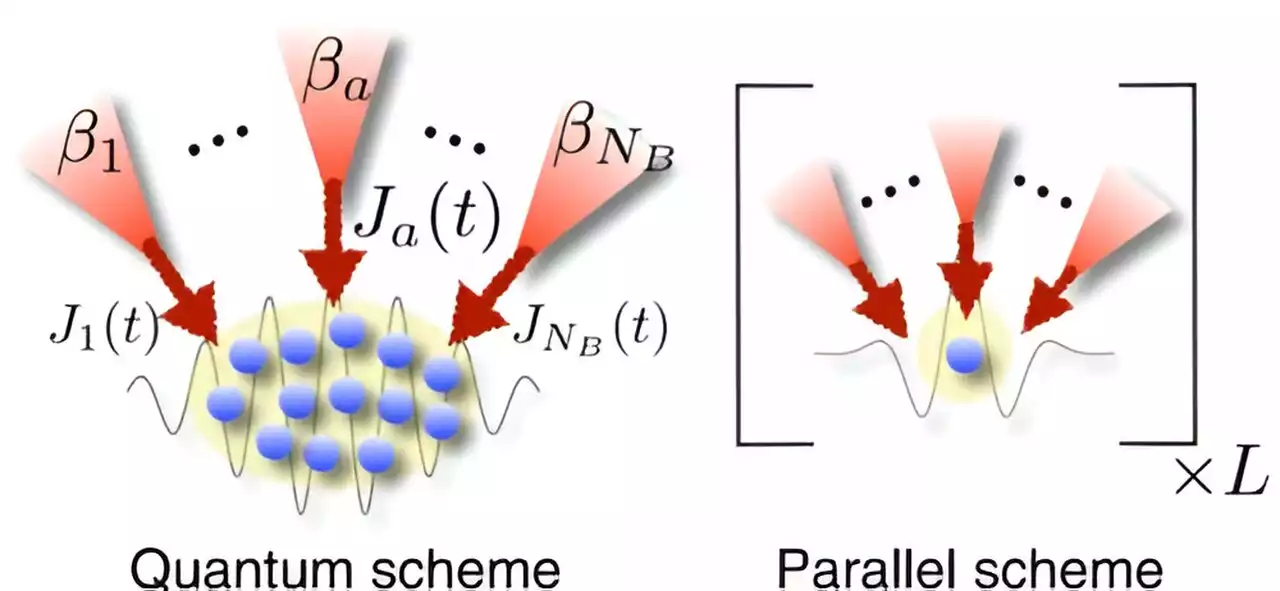Hotter quantum systems can cool faster than initially colder equivalents. Does hot water freeze faster than cold water? Aristotle may have been the first to tackle this question that later became known as the Mpemba effect. This phenomenon originally referred to the non-monotonic initial tempera
Researchers investigated the Mpemba effect in quantum systems, a phenomenon where hotter water can freeze faster than cooler water. This quantum Mpemba effect retains memory of its initial conditions, affecting its thermal relaxation later. The team used two systems with quantum dots and discovered the thermal quantum Mpemba effect across various conditions, suggesting possible broader applications beyond thermal analysis.
The Mpemba effect is a counterintuitive phenomenon where hot water can freeze faster than cold water under certain conditions. Named after Erasto Mpemba, a Tanzanian student who observed this effect in the 1960s and subsequently brought it to the attention of the scientific community, the phenomenon has been a topic of curiosity for centuries, with references dating back to the likes of Aristotle. The exact cause of the Mpemba effect is still a topic of debate among scientists.
Two systems with quantum dots connected to a heat bath, one with a current flowing and the other in an equilibrium state. The time evolution toward a steady state was followed for each. Credit: KyotoU/Hisao Hayakawa
Australia Latest News, Australia Headlines
Similar News:You can also read news stories similar to this one that we have collected from other news sources.
Graphene’s Quantum Magic: Perfection Is OverratedThe carbon material graphene has excellent electronic properties. But are they also stable enough to be useful in practice? New calculations say: Yes. New computer model demonstrates that graphene's exceptional electronic properties remain stable, even with imperfections, endorsing its potential
Read more »
 A theory of strong-field non-perturbative physics driven by quantum lightNon-perturbative interactions (i.e., interactions too strong to be described by so-called perturbation theory) between light and matter have been the topic of numerous research studies. Yet the role that quantum properties of light play in these interactions and the phenomena arising from them have so far remained widely unexplored.
A theory of strong-field non-perturbative physics driven by quantum lightNon-perturbative interactions (i.e., interactions too strong to be described by so-called perturbation theory) between light and matter have been the topic of numerous research studies. Yet the role that quantum properties of light play in these interactions and the phenomena arising from them have so far remained widely unexplored.
Read more »
 Deriving the fundamental limit of heat current in quantum mechanical many-particle systemsResearchers from the University of Tsukuba have mathematically derived the fundamental limit of heat current flowing into a quantum system comprising numerous quantum mechanical particles in relation to the particle count.
Deriving the fundamental limit of heat current in quantum mechanical many-particle systemsResearchers from the University of Tsukuba have mathematically derived the fundamental limit of heat current flowing into a quantum system comprising numerous quantum mechanical particles in relation to the particle count.
Read more »
 Fabricating atomically-precise quantum antidots via vacancy self-assemblyNational University of Singapore (NUS) scientists demonstrated a conceptual breakthrough by fabricating atomically precise quantum antidots (QAD) using self-assembled single vacancies (SVs) in a two-dimensional (2D) transition metal dichalcogenide (TMD).
Fabricating atomically-precise quantum antidots via vacancy self-assemblyNational University of Singapore (NUS) scientists demonstrated a conceptual breakthrough by fabricating atomically precise quantum antidots (QAD) using self-assembled single vacancies (SVs) in a two-dimensional (2D) transition metal dichalcogenide (TMD).
Read more »
 Terahertz SNOM Microscope: New Tool Helps Improve Key Quantum Computing CircuitScientists utilized the terahertz SNOM microscope to detect flaws in quantum computing circuits, specifically in the nano Josephson Junction. Addressing these defects is essential for optimizing quantum computing's faster processing capabilities. Researchers used a new tool to help improve a key
Terahertz SNOM Microscope: New Tool Helps Improve Key Quantum Computing CircuitScientists utilized the terahertz SNOM microscope to detect flaws in quantum computing circuits, specifically in the nano Josephson Junction. Addressing these defects is essential for optimizing quantum computing's faster processing capabilities. Researchers used a new tool to help improve a key
Read more »
 ‘Quantum Leap’ Adds Peter Gadiot and Eliza Taylor as Series Regulars for Season 2 (EXCLUSIVE)“Quantum Leap” will come back for Season 2 at NBC with two new series regulars: Peter Gadiot and Eliza Taylor. One of the few scripted projects returning to broadcast TV this fall amid …
‘Quantum Leap’ Adds Peter Gadiot and Eliza Taylor as Series Regulars for Season 2 (EXCLUSIVE)“Quantum Leap” will come back for Season 2 at NBC with two new series regulars: Peter Gadiot and Eliza Taylor. One of the few scripted projects returning to broadcast TV this fall amid …
Read more »
